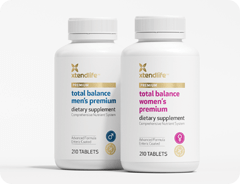Perhaps nothing leaves us feeling as out of sorts as a sluggish, problematic digestive system. Beyond the simple side effects including gas and bloating, serious digestive-based problems such as Crohn’s disease or other irritable bowel syndrome issues can negatively impact our quality of life.
And while there’s nothing exactly funny about digestive woes, virtually the entire two-part episode of “Seinfeld” called “The Pilot” focused on Kramer and his inability to find a restroom when he needed one, along with the unwelcome constipation that followed.
Everyone understands digestive problems – the relatable issue helped make the episode one of the iconic series’ most popular - but that doesn’t mean that everyone needs to suffer from them.
Common Ailments of the Digestive Tract
While frequent gas and bloating are the most common digestive problems most people face, many others cause frequent complaints, if advertising for medications is any indication. Some of the top digestive complaints include:
- Acid reflux. An estimated one in 20 people is taking medication to treat acid reflux (also known as gastroesophageal reflux disease or GERD) and the painful heartburn that comes with it. It is often caused by physical changes in the digestive tract or surrounding areas that allow stomach acids to enter the esophagus.
- Peptic ulcers. Caused by a bacteria that wreaks havoc with the stomach’s protective lining, ulcers can be painful and dangerous if untreated.
- Diverticulitis. When pouches of the intestinal tract become inflamed – usually due to a low-fiber diet - they can rip, tear, or bulge, which causes pain, Previous recommendations have been to skip nutrient-rich foods such as nuts and seeds to prevent discomfort, but new research shows that these foods can prevent the problem. Sometimes, a surgical intervention is required.
- Inflammatory bowel disease. Disorders including Crohn’s disease and ulcerative colitis can cause pain, diarrhea, and a host of other unpleasant symptoms. Both are believed to be sparked by immune system problems, and a cocktail of drugs is the most common treatment.
- Constipation. Medications such as opiates, dehydration, and low-fiber diets can trigger episodes of constipation. While medications can treat it, they can also lead to a dependence, so experts suggest adding fiber first.
- Celiac disease and lactose intolerance. Celiac disease is caused by a sensitivity to gluten, found in wheat, barley, and rye. Those who are lactose intolerant have trouble digesting dairy products. Symptoms include gas, bloating, diarrhea, and abdominal pain.
Resolving Digestive Woes Naturally
Digestive woes such as those we’ve talked about cannot only have a negative impact on your quality of life, but they can also lead to more serious health problems sparked by imbalances between good and bad bacteria as well as a buildup of toxins that can eventually cause disease.
Experts recommend a high-fiber diet to avoid digestive problems, but that’s really just the tip of the iceberg.
The goal is to not only restore the function of the digestive tract but also to create a healthy environment that positively impacts total body health.
One of our Core Wellness products, our Kiwi-Klenz formula, relies entirely on the natural fiber, phenolics, enzymes, and antioxidants of kiwifruit to restore digestive health.
While it may not be a magic bullet for all of your digestive problems, it has been shown to take on some of the toughest disorders, including gas, bloating, constipation, and diarrhea, and it offers plenty of benefits beyond those as well.
Because our kiwi-based supplement uses all of the kiwifruit, including the fiber-rich skin and seeds, Kiwi-Klenz makes the most of all the benefits the fruit has to offer, including:
- Digestive enzymes that will break down the foods we eat properly so all the nutrients those foods offer are accessed;
- Prebiotics to feed our body’s good bacteria;
- Phenolics to help suppress bad bacteria and restore health to the digestive tract; and
- Soluble fiber to help flush toxins out of the colon, erasing buildup that can leave us feeling sluggish and slow.
Because of the synergistic relationship between the four key components of Kiwi-Klenz, the entire digestive process is improved.
Pre vs. Pro: The ‘Biotics’ Story
While most of the media accounts and advertisements would have us believe that probiotics are the clear answer to every digestive health issue, again, there is more to the story.
Probiotics are the so-called good bacteria that make their home in our digestive tract, on hand to boost our immune system and help fight inflammation.
According to Dr. Mehmet Oz, our stomachs are home to more than 500 different probiotic bacteria, which not only help promote digestion but also are part of the process of providing our bodies with the essential nutrients we need to feed our cells.
When we treat our bodies well, those probiotic bacteria are in balance, but factors such as a poor diet, obesity, antibiotics, and other drugs can throw them off, leading to a host of problems including the obvious ones revealed through digestive woes.
Prebiotics are the fuel in our food that essentially feeds existing probiotics while helping our bodies manufacture more.
Adding prebiotics to your diet – such as those found in our digestive powerhouse supplement Kiwi-Klenz – can make a bigger difference than simply adding more probiotics.
Benefits of Digestive Health
One thing that slim people have in common is the kind of good bacteria they have living in their gut.
Unfortunately, obese people tend to have the same bacteria in common, and that could be a key contributor to the difficulties that some have in losing weight.
However, a recent study suggests that those bacteria are not set in stone.
According to researchers from Harvard University and Massachusetts General Hospital, changes in the good bacteria found in the gut, making them more in line with the bacteria of thin people, can lead to significant weight loss, even without any other changes.
Although the study focused on mice, it does open the door to potential human studies regarding the relationship between weight and the presence of certain bacteria.
According to the study, mice that underwent the specific Roux-en-Y method of gastric bypass saw their gut bacteria almost immediately transform to that of those found in slender mice. The changes came with elevated metabolism as well as the ability to extract fewer calories from foods during the digestive process, which accentuated weight loss.
Researchers hope that science will eventually be able to mimic the effects of gastric bypass by introducing the so-called slimming microbes to the digestive tracts of those who are overweight as a way to induce weight loss, without the significant risks of surgical intervention.
Benefits of Digestive Health
Beyond being regular, a healthy digestive tract can offer plenty of other benefits.
Skin conditions including eczema and acne can signal a troubled digestive tract, and restoring digestive health can in some cases resolve these conditions.
In addition, a digestive tract that’s healthy and able to absorb all the nutrients it takes in – through both food as well as our cell-enhancing Total Balance formulas – has the potential to benefit allergy-based and autoimmune conditions as well as depression, attention deficit disorder, and Parkinson’s disease, according to various experts.
Other Tips for Digestive Health
While a supplement such as our Kiwi-Klenz can set the stage for excellent digestive health, making healthy life choices also plays a part in preventing gas, bloating, constipation, and diarrhea.
- Drink plenty of water. Proper hydration can go a long way toward helping to keep your digestive tract functioning smoothly, especially if you’re taking certain medications that can lead to problems.
- Exercise regularly. Not only does exercise tone up your muscles, but it also helps tone your intestines and is essential to regular bowel movements.
- Don’t ignore your body’s needs. Like Kramer, who was unable to find a restroom in time and found himself suffering from constipation, putting off your needs can lead to trouble.
- Skip caffeine and cigarettes. Both can upset your digestive system.
- Eat plenty of fresh fruits and veggies for good fiber. A fiber-rich diet is vital to digestive health.
- Don’t take laxatives. The chemicals in most over-the-counter laxatives can disrupt healthy bowel function, leading to chronic constipation. (Since it is all-natural, our Kiwi-Klenz can help keep you regular without such unhealthy side effects.)
The Bottom Line
For better digestive health – the cornerstone of overall health and vital to our feelings of well-being – It’s important to treat your body with a little bit of respect.
Our Core Wellness sets – Kiwi-Klenz, Total Balance, and our Omega-3 / DHA Fish Oils – may help restore balance and promote cell health, leading to a healthier, happier life.
References:
- http://www.xtend-life.com/healthconditions/Digestive_Health.aspx
- Eight Common Digestive Problems and How to End Them, US News and World Report, Sept. 6, 2012, http://health.usnews.com/health-news/articles/2012/09/06/8-common-digestive-problems-and-how-to-end-them
- Nicola Jones, “Gut-microbe swap helps mice lose weight, March 27, 2013, http://www.nature.com/news/gut-microbe-swap-helps-mice-shed-weight-1.12688


 Supplements
Supplements Bundles
Bundles












